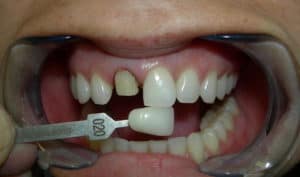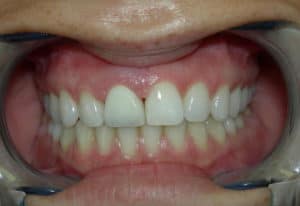By Arthur Kezian
Uh oh. Your cosmetic dental porcelain veneer has just fallen off.
Now what?
There are two things you need to do right now. First, wrap your veneer in a tissue, and store it in something hard to protect it (like a medicine bottle, for example). Then, call your cosmetic dentist so that he can assess the damage. If you’re lucky, he will be able to fix the problem the easy way — dental veneer recementing.

Like the term suggests, your cosmetic dentist will prepare your tooth and your veneer to be reattached. He’ll apply the cement to the inside of the veneer and place it over the front of your tooth. After that, he’ll use a special curing light to seal everything in place. By the time he’s done, no one will be able to tell that anything ever went wrong. This process takes about an hour, and it’s the most affordable of solutions because your dentist can use the existing veneer, instead of having to wait for the lab to manufacture another one.
Sounds simple, right?
Unfortunately, though, ALL veneer issues can’t be fixed this way. If you’re wondering whether or not
you can have dental veneer recementing, there are 4 things you need to know:
-
Only veneers that have come off whole can be recemented
If your dental veneer has chipped or cracked, your dentist will likely have to start over with a new veneer. (That’s why it’s so important to protect it as soon as something happens!)
-
Your existing tooth might be to blame
Even the sturdiest dental veneer needs a strong existing tooth to anchor to. If your tooth has decayed significantly since your porcelain veneer was installed, the damage can be enough to make

your veneer fall of whole. If that’s the case, you’ll need an expert Los Angeles cosmetic dentist who can tackle the decay first, then progress to dental veneer recementing.
-
The bonding adhesive might be the culprit
This is one of the most common reasons for a porcelain dental veneer to fall off. Sometimes, there’s simply an issue with the bonding adhesive, and it doesn’t hold as strongly as it’s supposed to. If your dental veneer was relatively new when it slipped off, the bonding adhesive is most likely to blame.
However, even the best bonding adhesive can only last for so long. The average lifespan for cosmetic dental porcelain veneers is right around ten years. If you’ve had yours for that long, one might slip off simply because the bonding adhesive has maxed out its lifespan.
-
Your habits might have to change
There are certain things you may be doing that pose a serious threat to your dental veneers. Eating super-sticky foods, chewing on pieces of ice, and grinding your teeth can all damage your veneers. If you’re lucky and the veneer came off whole — instead of chipping or cracking — it can likely be recemented. After that, though, you and your cosmetic dentist will need to assess your habits. For example, you may need to wear a bite guard at night to counteract all of that tooth grinding.
Now that you know how recementing works, it’s time for you to find the best dentist to work with. An expert dentist will not only recement your veneer with ease, he will also be able to spot dental veneer issues before they become too severe. If he can see that your bonding adhesive is starting to weaken, or that your teeth are staring to decay, he can help you prevent small issues from turning into big problems.
Dr. Arthur A. Kezian DDS 443 N. Larchmont Blvd Los Angeles, CA 90004 (323) 467-2777
